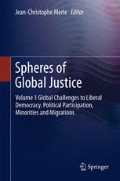Abstract
Most of the studies on “ethnic,” “ethno-political” or “minority” parties in Central Europe oscillate between two interpretations of the impact of “ethnic parties” on democratic processes. The first interpretation acknowledges the value of “ethnic parties” that guarantee the political participation of minority groups and thereby integrate them into the political system. The second interpretation adopts an opposite stance. Minority parties are perceived as weakening newborn democracies by institutionalising cultural diversity and encouraging the “ethnicization” of states. The examination of the Democratic Alliance of Hungarians in Romania (DAHR) proposed here aims at getting out of this dual interpretation based on a normative vision of democracy and often on a primordial representation of identity. The politicization of identity is based on changing identity configurations, and reshapes them at the same time. Besides the political entrepreneurs of minority communities are faced with a post-communist context characterised by the elasticity of the political landscape at a time when the social and territorial bases of power are being redefined. These local transformations are interacting with European as well as regional dynamics—such as the political changes taking place in the Hungarian “Kin-State”.
Access this chapter
Tax calculation will be finalised at checkout
Purchases are for personal use only
Notes
- 1.
The Treaty of Trianon (4 June 1920) confirmed Hungary’s loss of two-thirds of its territory and one-third of its population, part of which was Hungarian.
- 2.
Hungary joined NATO on 12 March 1999 and the European Union on 1 May 2004. Romania became part of the Atlantic Alliance on 29 March 2004 and joined the EU on 1 January 2007.
- 3.
“Barometrul relaţiilor interetnice” [“The Barometer of Interethnic Relations”], Metro Media Transilvania, November 2001, 19.
- 4.
“A fiatalok mennének” [“The young will leave”], Szabadság, July 21, 2003. Accessed at: http://www.hhrf.org/szabadsag/3jul-21t.htm.
- 5.
The Hungarian population has declined from 10,568,000 inhabitants in 1989 to 10,197,119 in 2001.
- 6.
Romániai Magyar Szó, December 26, 1989, 1.
- 7.
“Nyilatkozat a nemzeti kérdésröl” [“Declaration on the national question”], Romániai Magyar Szó, October 27, 1992, 1.
- 8.
In 1993, 2.05% of the population declared they were not ethnically Hungarian.
Bibliography
Brubaker, R. 1996. Nationalism reframed. Cambridge: Cambridge University Press.
Brubaker, R. 1999. Myths and misconceptions in the study of nationalism. In National self-determination and secession, ed. M. Moore, 233–265. Oxford: Oxford University Press.
Burgess, A. 1999. Critical reflections on the return of national minority rights regulation to East/West affairs. In Ethnicity and democratization in the New Europe, ed. K. Cordell, 49–60. London/New York: Routledge.
Capelle-Pogăcean, A., and N. Ragaru. 2008. En quoi les partis ‘ethniques’ sont-ils ‘ethniques’? Les trajectories du MDL en Bulgarie et de l’UDMR en Roumanie. In Questions de recherche. http://www.ceri-sciencespo.com/publica/question/qdr25.pdf. Accessed June 25, 2008.
Chandra, K. 2005. Ethnic parties and democratic stability. Perspectives on Politics 3(2): 235–252.
Deets, S. 2002. Reconsidering East European minority policy: Liberal theory and European norms. East European Politics and Societies 16(1): 30–53.
Deets, S. 2006. Re-imagining the boundaries of the nation: Politics and development of ideas on minority rights. East European Politics and Societies 20(3): 419–446.
Ishiyama, J.T., and M. Breuning. 1998. Ethnopolitics in the New Europe. Boulder: Lynne Rienner.
Johns, M. 2003. Do as I say, not as I do. East European Politics and Societies 17(4): 682–699.
Kymlicka, W., and M. Opalski (eds.). 2001. Can liberal pluralism be exported ? Western political theory and ethnic relations in Eastern Europe. New York: Oxford University Press.
Medianu, N. 2002. Analysing political exchange between minority and majority leaders in Romania. The Global Review of Ethnopolitics 1(4): 28–41.
Noiriel, G. 1995. Socio-histoire d’un concept. Les usages du mot “nationalité” au XIXe siècle. Genèses 20: 4–23.
Ragaru, N. 2007. Repenser la politisation des identités. Les engagements militants dans les Balkans d’aujourd’hui. Revue d’études comparatives Est-Ouest 38(4): 5–28.
Riedel, S. 2002. Minorités nationales en Europe et protection des droits de l’homme: Un enjeu pour l’élargissement. Politique Étrangère 3: 647–664.
Roger, A. 2002. Economic development and positioning of ethnic political parties: Comparing post-communist Bulgaria and Romania. Southeast European Politics 3(1): 20–42.
Sasse, G., and E. Thielemann. 2005. A research agenda for the study of migrants and minorities in Europe. Journal of Common Market Studies 43(4): 655–671.
Smith, D.J. 2002. Framing the national question in Central and Eastern Europe: A quadratic nexus? The Global Review of Ethnopolitics 2(1): 3–16.
Stein, J.P. (ed.). 2000. The politics of national minority participation in post-communist Europe. State building, democracy, and ethnic mobilization. New York: East-West Institute.
Tesser, L.M. 2003. The geopolitics of tolerance: Minority rights under EU expansion in East-Central Europe. East European Politics and Societies 17(3): 483–532.
Waterbury, M. 2006. Internal exclusion. External inclusion: Diaspora politics and party-building strategies in post-communist Hungary. East European Politics and Societies 20(3): 483–515.
Author information
Authors and Affiliations
Corresponding author
Editor information
Editors and Affiliations
Rights and permissions
Copyright information
© 2013 Springer Science+Business Media Dordrecht
About this chapter
Cite this chapter
Capelle-Pogăcean, A. (2013). Minority Parties, Parties Not Unlike the Others: The Case of the Democratic Alliance of Hungarians in Romania (DAHR). In: Merle, JC. (eds) Spheres of Global Justice. Springer, Dordrecht. https://doi.org/10.1007/978-94-007-5998-5_14
Download citation
DOI: https://doi.org/10.1007/978-94-007-5998-5_14
Published:
Publisher Name: Springer, Dordrecht
Print ISBN: 978-94-007-5997-8
Online ISBN: 978-94-007-5998-5
eBook Packages: Humanities, Social Sciences and LawPhilosophy and Religion (R0)

